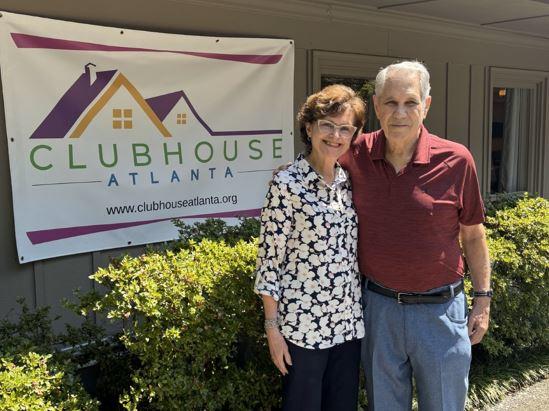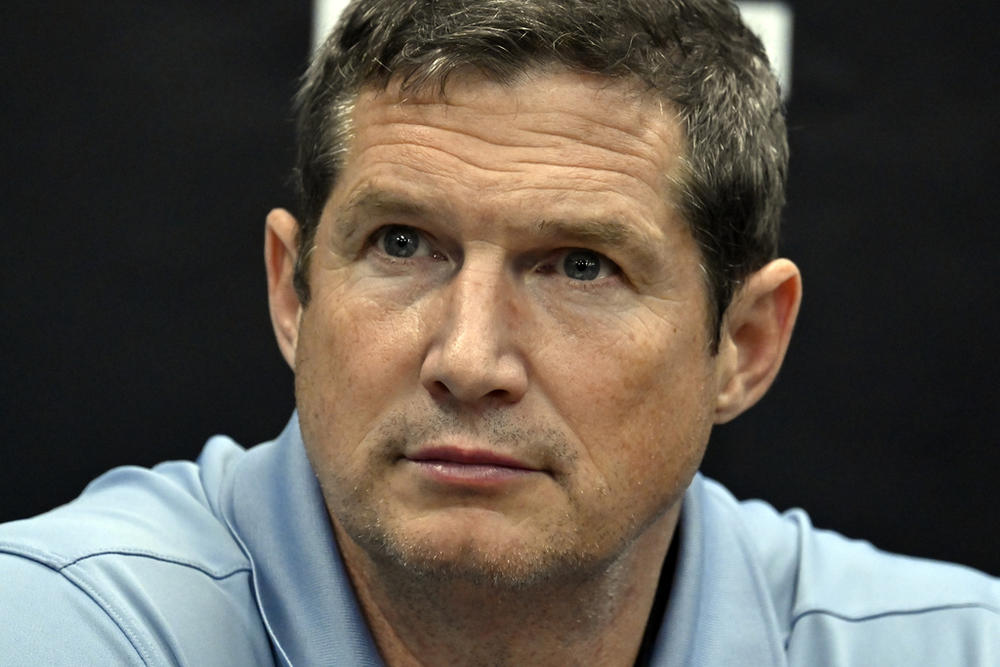
Section Branding
Header Content
Georgia Today: President-elect Trump's tariffs plan explained; Peer support centers; Crisis in Gaza
Primary Content
LISTEN: On the Wednesday, Nov. 13 edition of Georgia Today: A look at how President-elect Trump's proposed tariffs would impact the economy and your wallet; Georgia leaders invest in peer support centers to help those with behavioral health issues; and two Atlanta based humanitarian groups call for Israel to be held accountable for the crisis in Gaza.

Peter Biello: Welcome to the Georgia Today podcast from GPB News. Today is Wednesday, Nov. 13. I'm Peter Biello. On today's episode, we'll look at how President-elect Trump's proposed tariffs would impact the economy and your wallet. Georgia leaders invest in peer support centers to help those with behavioral health issues. And two Atlanta-based humanitarian groups call for Israel to be held accountable for the crisis in Gaza. These stories and more are coming up on this edition of Georgia Today.
Story 1:
Peter Biello: The man charged with murder in a 2023 shooting that killed one woman and wounded four others at a Midtown Atlanta medical office will not stand trial. A Fulton County judge ruled yesterday that Deon Patterson is not competent to stand trial and will receive behavioral health care. Patterson's attack killed a 38-year-old medical researcher, Amy St-Pierre. The attack also shut down a busy part of Atlanta and led to an hourslong manhunt. Another hearing on his condition will be scheduled within three months. And if Patterson is later deemed competent, he'll return to court for more proceedings.
Story 2:
Peter Biello: All 26 of Georgia's public universities and colleges added students this fall in the strongest enrollment surge in years. Enrollment rose 6% statewide from fall 2023, which is double the national average. GPB's Chase McGee has more.
Chase McGee: That increase of nearly 20,000 students set a new record of nearly 365,000, surpassing last year's previous high of 344,000. University System of Georgia officials say schools are benefiting from the Georgia match program. It sends letters to high school seniors urging them to apply for admission. Also continuing to power the surge were the online master's degree programs offered by Georgia Tech. The Atlanta University saw enrollment grow by another 11% and is now Georgia's largest university with more than 53,000 students. For GPB News, I'm Chase McGee.
Story 3:
Peter Biello: Georgia State University is getting $80 million in what it calls the largest gift in its history. The school will use the gift as part of a $107 million transformation of its campus in downtown Atlanta before 2026. The $80 million grant from the Robert W. Woodruff Foundation announced yesterday will help rework downtown's Woodruff Park and renovate several buildings. The broader hope is that the increased student activity will make downtown a more welcoming place in time for the World Cup planned for 2026.
Story 4:
Peter Biello: A release of monkeys from a South Carolina compound that breeds the primates for medical research is causing concern in Southwest Georgia. Authorities in Yemisi, S.C., between Savannah and Charleston, say most of the 43 monkeys that escaped from a breeding facility there have been returned to their compound in Southwest Georgia's Bainbridge. Many residents have been fighting for months to stop a similar facility. One of the project's opponents, Lisa de Silva, says the South Carolina escape is reinvigorating opposition in Bainbridge.
Lisa de Silva: They said that would never happen, that there's no way they could get out, that — these monkeys have thoughts about their thoughts. They're smart. They're smart as we are on many levels.
Peter Biello: Authorities in South Carolina say the escaped monkeys pose no risk to the public.

Story 5:
Peter Biello: President-elect Donald Trump has promised to implement an at least 10% tariff on all imported goods and a 60% tariff on goods from China. If he's able to enact them, how would those tariffs impact the economy overall and, specifically, individuals? Sina Golara, assistant professor of supply chain and operations management at Georgia State University's Robinson College of Business, has studied how tariffs ripple through the American economy. And he's with us now. Welcome to the program.
Sina Golara: Thanks for having me.
Peter Biello: So you've written that tariffs can provide short-term relief to some parts of the economy, as well as a psychological lift to the public. But the politicians should use tariffs with caution. Why? Why should they use them with caution?
Sina Golara: Essentially, because it brings politics into an otherwise economic matter. When businessmen are allowed to operate with more freedom, they can choose optimal business activities, optimal mix of things to produce and import. But when politics get in the way, the objective kind of deviates from economic value and economic optimization.
Peter Biello: And you've studied how presidents have used tariffs. Can you talk a little bit about how presidents in the past 50 years or so have used them?
Sina Golara: In a nutshell, typically tariffs are used as a fast and quick tool to solve specific shortages of domestic industries. Whenever ... an industry that is deemed a strategic or too important of falls short, governments, especially the U.S., come in and try to block the entry of foreign goods or make it difficult. So in these cases, what we have learned over the years from more than a century of economic analysis is that typically these tariffs don't lead to a lot of positive results. It's not impossible, but it's typically negative on the net.
Peter Biello: Have some tariffs actually yielded long-term benefits? And if so, what were the qualities of those tariffs that enabled long-term success?
Sina Golara: Yeah. So once you impose tariffs, that creates revenue for the government. What happens next all depends on what is done with that money. If that money is then returned to that industry or some other industry for investment in an area where they are really, really lacking and this investment will generate additional productivity down the road, these negative consequences that we talked about could be negated. So it's not a guaranteed negative result. But the problem is you depend on very good allocation of those resources after that.
Peter Biello: What we've been describing are tariffs that are limited to specific industries. But what happens when there is a broad tariff applied not to the kind of item necessarily, but to the location of its production, like China? I understand there's a tariff on Chinese products right now, but under the next administration, the goal is to increase those tariffs. What do you see as the impact of that kind of tariff?
Sina Golara: Yeah. So basically it's important to understand tariffs are directly imposed not on China, but on importers from China. Tariffs are essentially a tax on those companies. If they try to absorb the costs themselves, no one else feels it except their profitability goes down and they will probably have to lay off workers. And that's how you get the negative consequences. But if the result of that is these companies try to, for example, switch to another country and if there is good replacement, then the American importers wouldn't feel that much of a negative effect; a little bit of cost, but not as much as they could have in the absence of an alternative. So that would be a good scenario. Alternatively, these American importers cannot find any good replacement and then they just have to produce less. They have to absorb more costs, pass on the costs to consumers, which is definitely going to be part of the consequences we'll see. And that will cause inflation. That will cause less jobs in those industries. And then a long-term relationship that's been there between the American importer and the Chinese exporter is going to be damaged permanently.
Peter Biello: Are you saying then that it's likely that rather than American importers finding exporters other than Chinese exporters, that's less likely than them simply increasing prices and then passing on that price increase to the American consumer?
Sina Golara: It all depends on the specifics, right? When you think about, for example, electronics, we are importing 70% of our electronics from China. It would be very, very difficult to find good replacements. So you should be seeing quite a bit of increase in prices. Many companies are — don't have enough margin to kind of absorb a sudden increase in their prices. Remember, the proposed tariffs are supposed to be 60% on Chinese goods. That will be an additional $250 billion of costs for American importers. So the immediate effect actually would be to raise the prices and try to sort of cut costs —some layoffs — and then, over time, try to find better replacements or maybe even move production to the country and use internal — use domestic suppliers.
Peter Biello: Well, Sina Golara, thank you so much for speaking with me. I really do appreciate it.
Sina Golara: Thank you very much.
Story 6:
Peter Biello: Two Atlanta-based global humanitarian organizations are issuing strong calls to hold Israel accountable for deteriorating conditions for people in Gaza. The Carter Center and CARE both called on the U.S. to make an immediate determination that Israel is violating U.S. law by failing to comply with U.S. demands to improve access to food, water and medicine. The organizations were among many responding yesterday to a Biden administration decision not to limit arms to Israel. That's despite aid to Gaza falling to its lowest levels this year. The Biden administration says Israel has made good but limited progress in increasing the flow of humanitarian aid to Gaza. Israel's war in Gaza has killed more than 43,000 people, according to Palestinian health officials. Those numbers include civilians and combatants. And Palestinian officials say more than half of those killed were women and children.

Story 7:
Peter Biello: Therapy for some people with behavioral health issues can be spotty, hard to access, and at times not available at all when they need it most. So increasingly, people are finding the support they need to stay healthy over the long term in community with other people like them. That's why Georgia leaders are investing in so-called peer support centers. GPB's Ellen Eldridge takes us to Clubhouse Atlanta.
Ellen Eldridge: A handful of people gather around a white plastic table. Some talk. Others hold virtual conversations on their phones. Desks decorate the open space of what could be a gym or a cafeteria. The reflection of a life-sized cross shines on the maroon floor of St Patrick's Episcopal Church in Dunwoody. There's a coffee bar in the corner. These people have come to what's called Clubhouse Atlanta to work. Work here can mean a lot of different things to Clubhouse members like 39-year-old Chris Price.
Chris Price: I've been here since the first day and have been involved in all the different units, including the culinary unit and then the snack bar. And yeah, I've just been kind of helping out, helping keep the program running.
Ellen Eldridge: In this peer support model, work is purpose and education. It's part of a path to a stable life. The coffee bar in the corner, staffed by other Clubhouse members. After four years here. Chris Price has a part-time paid job as a communications coordinator for a local chamber of commerce. Susie Kyle and Bill McClung founded Clubhouse Atlanta.
Bill McClung: Susie and I have both lost children to mental illness problems. I lost a daughter about 12 years ago. And Susie lost her son about three years ago, as we were really getting going in the Clubhouse.
Ellen Eldridge: Kyle says this was around the time Clubhouse was getting off the ground.
Susie Kyle: I lost him a month before.
Ellen Eldridge: She says her son needed community support.
Susie Kyle: One of the main things with my son is that he didn't have anywhere to go and he was riding MARTA around and no place to go. And this is a place to come and to have friends and to make — to learn how to be the best you can be.
Ellen Eldridge: Like Susie Kyle's son, Lilly Hesketh says she needed a place like this long before it ever existed.
Lilly Hesketh: If I had something like this when I was younger, I believe that I would probably be a little bit in a better space.
Ellen Eldridge: After about a year, Hesketh has a job at a nearby salon. She still visits the Clubhouse weekly when her schedule allows. Clubhouse membership is lifelong. Studies show that social inclusion — being around friends and people you like — lowers the rate of suicide and rates of hospitalization and incarceration associated with mental illness. Clubhouse Atlanta is in Georgia state Sen. Sally Harrell's district. Harrell says the peer support model is a proven one.
Sally Harrell: It's's been proven to save thousands of dollars in mental health care costs.
Ellen Eldridge: Harrell's steered a quarter million dollars in state money to clubhouse Atlanta. She says that's because the safety net for behavioral health should go beyond crisis care.
Sally Harrell: It's sad if that's all we're doing because a life in crisis is no life at all. That's — that's painful.
Ellen Eldridge: The state is continuing to invest in more peer support and community centers, including $14 million for a new facility in Macon-Bibb County. That's slated to open by the end of 2025. For GPB News, I'm Ellen Eldridge.
Story 8:
Peter Biello: An iconic Georgia tradition will return this year to celebrate the holiday season. The Georgia Festival of Trees will open later this month in Duluth, north of Atlanta, with a very special guest. GPB's. Amanda Andrews reports.
Amanda Andrews: Penny The Pink Pig will debut this year at the Georgia Festival of Trees. The pig-themed train ride is the successor of Priscilla, the original Pink Pig, which debuted in 1953 at Rich's department store in Atlanta. Festival executive director Angela Berry says she had a lot of people asking when the pig would return.
Angela Berry: It's this feeling of nostalgia. You could tell it was a very important part of their childhood and it was something that they miss. It, it ended — I think they retired her in 2021, I believe. And so people really were missing that part of Christmas.
Amanda Andrews: The festival will include rides, entertainers and a tree auction to raise funds to fight human trafficking. The festival opens Nov. 23. For GPB News, I'm Amanda Andrews.
Story 9:
Peter Biello: A former Macon newspaper publisher, editor and journalist who covered pivotal moments in Georgia's history has died. J. Reginald, better, known as "Reg" Murphy, worked for the Macon Telegraph, the Atlanta Journal-Constitution and other news outlets around the country. He was the editorial page editor of the Atlanta Constitution in 1974, when he was kidnaped and held for two days by a man seeking $700,000 in ransom. The paper paid the ransom two days later, and he went on to continue reporting. The Gainesville native died over the weekend. Reg Murphy was 90 years old.

Story 10:
Peter Biello: In sports, the Atlanta Dream hired longtime Florida Gulf Coast coach Karl Smesko, to lead the team. Smesko built Florida Gulf Coast into a perennial NCAA tournament team and has the third-highest winning percentage in women's college basketball. The Eagles have been one of the top 3-point shooting teams in the country. Atlanta went 15 and 25 this year and qualified for the playoffs. The team has a strong young nucleus with Rhyne Howard and Allisha Gray leading the way, along with veteran center Tina Charles. And the Atlanta Hawks beat the Boston Celtics last night, 117 to 116. The Hawks host the Washington Wizards on Friday.
And that's all we've got for this edition of Georgia Today. We do appreciate you tuning in. We hope you'll come back tomorrow. There's more news on the way. If you subscribe to this podcast, we will pop up in your podcast feed every weekday afternoon. And for all the latest news, you can check our website GPB.org/news. Now if you have a comment about our coverage or want us to cover something that we haven't yet, please let us know by email. The address is GeorgiaToday@GPB.org. Again, GeorgiaToday@GPB.org. I'm Peter Biello. Thanks so much for listening. We'll see you tomorrow.
---
For more on these stories and more, go to GPB.org/news



